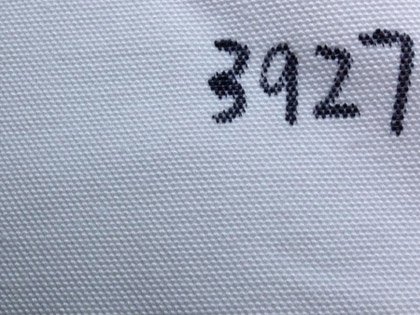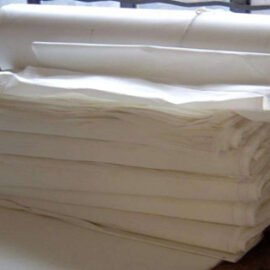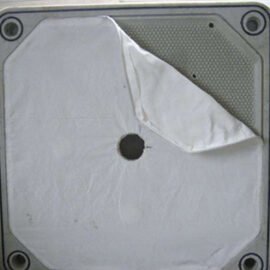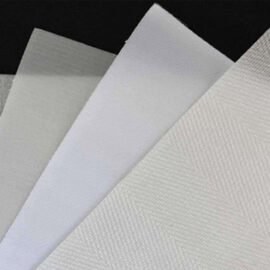
Filter cloth
Filter cloth is a filter medium woven from natural or synthetic fibers. Including metal mesh or filter screen. It is mainly used for air filtration and dust removal, dust collection powder, to purify the air and protect the environment in smelters, chemical plants, sugar, dyes, medicine, food and other industries.
Chinese name: filter cloth Foreign name: filter cloth Material: fiber
Function: filtration
Introduction
Content introduction
Filter cloth, a filter medium woven from natural or synthetic fibers. Commonly used materials include cotton, linen, wool, silk, asbestos fiber, glass fiber and some synthetic fibers. For example, cotton canvas, twill and woolen cloth. In a broad sense, filter cloth also includes metal mesh or filter screen.
Synthetic fibers mainly include polypropylene, polyester, nylon, vinylon, etc. Among them, polyester and polypropylene are the most commonly used, mainly for solid-liquid separation, while nylon is widely used in coal washing plants because of its excellent wear resistance.
Filter cloths and screens made of polyester, polypropylene, nylon, vinylon, cotton and other materials are widely used in pharmaceutical, chemical, dye, steel, construction, iron smelting, chemical, ceramic, cement, geology, mining and other industries.
Special filter cloths include: aramid, PTFE, PVDF, etc., with high operating temperature.
Advantages
Close to zero emission, can meet the most stringent environmental protection standards;
Good dust cleaning performance, can provide higher ventilation volume, or can reduce pressure difference;
Extended filter bag life, reduced cleaning times, reduce equipment maintenance costs;
Higher air-to-cloth ratio, can design a smaller dust collector, and reduce energy consumption when the pressure difference is reduced;
Dust bags are roughly divided into 3 categories based on temperature, normal temperature such as polyester needle felt bags, anti-static dust bags, easy-to-clean dust bags, etc. Medium temperature types such as polyester coated needle felt bags, three-proof dust bags, water-repellent and oil-proof needle felt, high temperature types such as Metas, dust bags, Fluoromes bags, glass fiber needle felt filter bags, PPS acid and alkali resistant bags, etc. The selection of dust bags should be based on factors such as gas temperature, humidity and chemical properties, particle size, weight, shape, dust concentration filtration speed, cleaning method, emission concentration and bag dust collector working system.
In general, pulse jet bag dust collectors use needle felt, chamber back-blowing bag dust collectors or mechanical vibration bag dust collectors use woven fabrics. If the working conditions are high temperature and require acid and alkali resistance and there is humidity, high temperature types such as coated Fluoromes can be selected. There are many factors to consider when selecting dust bags.
Classification
1. According to the shape of the cross-section of the dust filter bag, it is divided into: flat bags (trapezoidal and flat) and round bags (cylindrical).
2. According to the air inlet and outlet mode, it can be divided into: bottom air inlet and top air outlet, top air inlet and bottom air outlet, and direct current type (limited to plate-shaped flat bags).
3. According to the filtering mode of the dust filter bag, it can be divided into: external filtration type and internal filtration type.
4. According to the temperature tolerance of the dust filter bag, it can be divided into: high temperature type, medium temperature type, and normal temperature type. 5. Application field: iron and steel mills, ferroalloy plants, refractory plants, foundries, power plants, cement plants, chemical plants, grain processing plants, carbon black plants, aluminum plants, etc.
5. According to temperature, it can be divided into: (1) Low temperature type: suitable for bag dust collectors at local dust points such as raw material mills, cement mills, top and bottom of silos, etc., and when used under high humidity conditions, the surface needs to be treated with oil-repellent and waterproof treatment agents; (2) Normal and high temperature type: suitable for cement vertical kilns, rotary kiln tails, coolers, dryers, etc. Bag filter for high-temperature exhaust gas treatment, and when used under high temperature and high humidity conditions, its surface needs to be treated with oil-repellent and waterproof treatment agent;
Characteristics
For filter cloth, what affects its service life is not only the wear of the material itself, but more importantly, the corrosion of the working material to the filter cloth. Therefore, the requirements for industrial filter cloth are very high, and it mainly needs to have the following characteristics:
(1) Good capture effect after solids and long service life;
(2) Fast filtration speed, less clogging, and stable filtration speed;
(3) Good filter residue peeling property, no expansion and contraction, and good dimensional stability.
Selection
The selection of filter cloth is very important and plays an important role in the filtration process. Whether the filter cloth selection is reasonable directly affects the filtration effect and speed. When selecting filter cloth, the basic properties and filtration requirements of the filtration slurry should be considered in combination with the filter cloth’s permeability (water permeability or air permeability), filtration level (maximum and minimum pore size and porosity), service life (tensile strength and elongation), filter cloth structure and weaving method, chemical properties and cost.
1. According to the nature and particle size of the sludge, filter cloth that can effectively intercept sludge particles during filtration should be selected. The selection should be based on the pore size and water permeability (air permeability) of the filter cloth.
2. Filter cloths of different materials should be selected according to the pH value of the sludge. Generally, in order to extend the service life of the filter cloth, the polypropylene series filter cloth should be used in an environment with a pH value of 4 to 8, and the nylon series filter cloth should be used in an environment with a pH value of 5 to 8.5.
3. Filter cloths with different tensile strengths and elongations should be selected according to the filtration pressure.
4. When the filtering performance of the two filter cloths is similar, the cost of the filter cloth should be considered.
Application
Flue gas treatment and dust removal systems for iron and steel plants, ferroalloy plants, refractory plants, foundries, power plants, etc. Flue gas filtration of garbage incinerators, coal-fired boilers, fluidized bed boilers, etc. Asphalt concrete mixing, production sites of building materials, cement ceramics, lime, gypsum, etc. Aluminum electrolysis, lead, tin, zinc, copper and other rare metal smelting flue gas filtration, fine material recovery, liquid-solid separation. Liquid-solid separation and fine material recovery in the fields of chemical, coke, carbon black, dye, pharmaceutical, plastic, etc. Dust control and purification collection in mining, grain processing, flour, electronics industry, wood processing, etc.
Material Non-woven fabric Application range Vacuum cleaner, filter pot, fan, air purifier, paint room, water purifier.
Related information
Industrial status
The filter cloth industry belongs to the key development area supported by our country. The development of industrial filter cloth technology and technology are included in the national “15th Five-Year Plan” and “11th Five-Year Plan”. From the development of the world filter cloth industry, the development speed of filter cloth in various countries and regions is also amazing. In the past ten years, the average annual growth rate of filter cloth industry in the United States, Western Europe, Japan and other countries and regions is 4% to 6%, and the Asia-Pacific, South America and Eastern Europe regions have developed faster, with an annual growth rate of 8% to 10%, so the world filter cloth industry is still in a stage of continuous development. More than a dozen large filter cloth manufacturers in China are promoting the development of my country’s filter cloth industry with their vigorous vitality. However, in terms of scale and technical level, the development of these enterprises still cannot meet the demand for filter cloth at home and abroad. In the next 10 years, China will become the fastest-growing country in the world in the filtration and separation industry, and its market size ranks second in the world. The filter cloth industry, an emerging environmental protection market, is booming, and the development of my country’s filter cloth market still has immeasurable potential.
Market Prospects
The filter cloth industry is in the ascendant and plays an increasingly important role in many fields, especially in the field of environmental protection. The filter cloth industry has high advantages in terms of policy support, environmental protection needs, equipment support, raw material supply, and domestic and foreign market demand, and its market prospects are extremely promising. In urban construction, ecological demonstration cities and cities with serious environmental pollution will provide a broad market for the development and utilization of filter materials. As a major coal-burning country in the world, China’s air pollutants mainly come from the combustion of coal in the production process of power, steel, cement, smelting, chemical and other industries. To solve the problem of environmental pollution, the main method is to remove sulfur oxides and nitrogen oxides produced during coal combustion, and to filter, collect, remove dust and reuse various components and fly ash in flue gas. Flue gas filtration is different from dust collection and dust removal, because there are a large number of harmful and highly corrosive components in flue gas, and accompanied by high temperature and water vapor, which cause strong erosion and damage to the filter unit. The dust collector achieves the purpose of dust removal through the mechanical filtration of the filter material and the dust layer attached to the filter material. This environmental protection concept has led to a continuous increase in my country’s demand for the output and quality of filter materials. In addition, municipal sludge and sewage contain a large amount of organic matter, heavy metals, pathogenic bacteria and pathogens. The requirements of “economic, efficient and environmentally friendly” put forward by the domestic sludge treatment and disposal industry have further promoted the development of the filter cloth industry and made the filter cloth industry have a broader prospect. In addition to the above applications, filter cloth has also developed new products using new energy, new materials and new processes around key areas such as safety, environmental protection and energy saving, occupying the technical commanding heights. With the increasing attention paid to environmental protection worldwide, the broad application prospects of filter cloth cannot be underestimated. As the development of the western region gradually intensifies, the number of landfill and sewage treatment projects increases, and the use of filter cloth also increases. In summary, the development of the filter cloth market is bound to drive the synchronous development of other industries and make great contributions to the environmental protection cause, which has far-reaching social significance and broad market prospects.
Details
| Brand Name | JINGJIN |
|---|---|
| Warranty | 12 Months |





Reviews
There are no reviews yet.